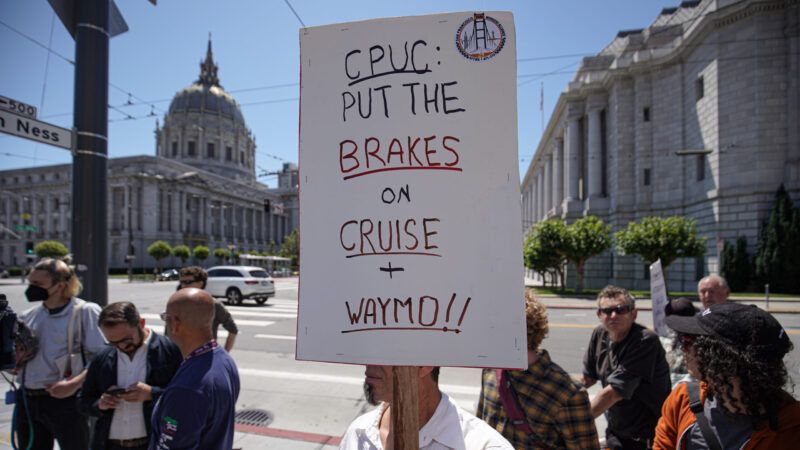The New Luddites Want To Pump the Brakes on Driverless Cars
To fully realize human flourishing, America must embrace the future—not fear it.

As demand for self-driving services such as Waymo grows, so does evidence of their safety. The autonomous ride-hailing service reports astronomical reductions in motor vehicle–related crashes and injuries in its autonomous vehicles (A.V.s) compared to cars helmed by humans.
But with innovation comes those who fear it. A recent incident in San Francisco, California, in which a Waymo vehicle struck and killed a "bodega cat" reignited fears and sparked outrage. In response, San Francisco city supervisor Jackie Fielder is demanding new restrictions on the A.V. company's operations, holding a related rally and asserting that the community must be "put before tech oligarchs."
In a statement, Waymo claimed the "cat darted under [the] vehicle as it was pulling away." The death of a pet is always tragic, but the reality is that human drivers are far more likely to be involved in harmful accidents than driverless vehicles are. Policymaking should be based on evidence, not sensationalized outrage.
Across 96 million miles of operation, Waymo cars reflect a sharp reduction in motor vehicle–related injuries and deaths. When compared to human drivers, the report indicates 91 percent fewer serious injuries, 92 percent fewer pedestrian crashes with injuries, and 79 percent fewer crashes resulting in airbag deployment.
Yet, just this summer, the Boston Teamsters Union called for their city to "hit the brakes" on Waymo and pass an ordinance to study the impact of A.V.s on "the economy, traffic, and public safety," and to establish an advisory board composed of "trade unionists and other stakeholders" to "guide any future rules for AV operators." The ordinance has the support of several members of the Boston City Council, but Waymo spokesman Ethan Teicher warned that the proposal would "ban autonomous vehicles based on vibes."
With the city's approval process in limbo, Waymo says it has "no definite plans" for a commercial launch in Boston; however, the company is already mapping the city's streets in preparation for offering service if regulations allow.
The protectionist ordinance would hand regulatory power to industry competitors and unions, depriving Bostonians of a safe and popular service. Appointing members of an interest group to oversee a committee with direct power over the operation of their competitors is a blatant conflict of interest. All transportation companies should compete freely for customers as in any other industry.
Boston is hardly an outlier in the broader anti-A.V. campaign. Last year, the city of San Francisco filed a lawsuit against the California commission that approved an expansion of A.V. operations. Statewide, a Teamsters-backed bill that would have required human drivers in all heavy autonomous trucks passed the legislature, but was vetoed by Democratic Gov. Gavin Newsom. Although Newsom's veto prevented the measure from taking effect, its passage demonstrates the same political muscle organized labor is flexing in Boston. The Teamsters are pushing a similar bill in Texas as well.
The New York State Federation of Taxi Drivers protested outside of Gov. Kathy Hochul's Manhattan office, asserting that autonomous vehicles could "threaten the livelihoods" of more than 200,000 New Yorkers. Its president went as far as to call anyone opposing a ban on autonomous vehicles an "enemy" of New York City's transportation industry.
Back in 2023, a group of 26 labor unions sent a letter to the U.S. Department of Transportation urging it to end the "unsafe" operation of autonomous vehicles. In 2021, a bill sponsored by Sen. John Thune (R–S.D.) to loosen federal A.V. regulations was killed in committee after fierce opposition from unions. Just this September, Sen. Josh Hawley (R–Mo.) declared, "We ought to ban" A.V.s, pledging to introduce related legislation.
These efforts form a coordinated resistance to market-driven modernization. The rhetoric may invoke safety, jobs, and public interest, but the real goal is to enlist the government as a weapon against competition.
Meanwhile, there is a clear market demand. Waymo's weekly ridership has surged from 10,000 to more than 250,000 in less than a year. The A.V. company, among others, is seeking to provide a service that consumers clearly want. Why should bureaucracy stand in the way?
History is littered with failed attempts to resist technological progress—efforts now proven absurd. Civilization didn't cave when the Luddites resisted textile mechanization in the early nineteenth century, nor did it cave when unions representing gaslight and horse-drawn carriage workers resisted electric lighting and automobiles. If those seeking to hinder advancements like these had their way, humanity would have never climbed out of the Stone Age. And today, we should not allow contemporary Luddites to thwart the unfolding progress of humanity.
To fully realize human flourishing, America must embrace the future—not fear it.


Show Comments (59)